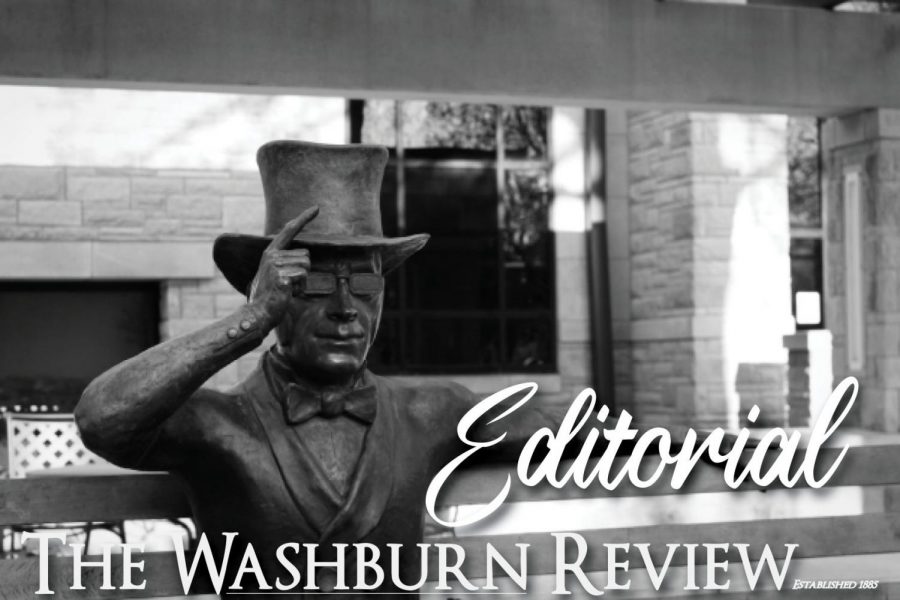Editorial: WU Can Do Better
March 19, 2019
Racism, Transphobia, Sexism, Ableism, Homophobia and every other form of bigotry are deeply ingrained in our society. While over time, such ideas have become less acceptable, the sheer volume of hate has arose as apologists continue to give excuses as justification. Because of this rise of rooted ideals, individuals, institutions and communities are given a choice: ignore and deny it or face it head on.
To say that Washburn University has only recently been affected by such forms of discrimination would be misleading and inaccurate. Unfortunately, Washburn has a rich history of reported incidents that have resulted in mistrust and the questioning of the validation of the experiences of individual students or faulty members courageous enough to report injustices. Unsurprisingly, students and faculty watched their reports lead to inaction, and many in the Washburn community were left feeling unheard, undervalued and scared. As a result, a recent trend on Washburn University has materialized and caught the eye of other students, faculty/staff, administration, and the community. The idea that through all of this hate and tension, #WUCanDoBetter.
As recent events concerning unacceptable behavior targeting marginalized groups made their way to social media, students began to combat this hate and rally allies with #WUCanDoBetter. This statement began to take over the “Washburn Twitter World” as many members of the Washburn Community came together to validate, mourn and educate others of their experiences and stories, inspiring faculty members and other students to acknowledge that issues need to be addressed so that all students feel safe and welcome on campus.
An important consequence of #WUCanDoBetter is that it has inspired a plethora of marginalized groups to speak out about their experiences in a different way, destroying the facade of inclusion that has been promoted to the outside world.
In light of recent events and similar to the campaign on Twitter, a group of students created a survey that has made its way around campus, reaching over 130 responses and asking members of the community if they have experienced forms of hate while attending Washburn University. The goal of both #WUCanDoBetter and the survey is to make sure that individuals in the Washburn community are heard and to be the #VoiceoftheVoiceless for the students who are afraid of the consequences that come with speaking their truth. Both WBSU and Halo have expressed their aggravation and disappointment as, on numerous occasions, people have tried to discredit them and invalidate their stories, while others have continued to ask for the retelling of their experiences at “town halls” with no action taken to make Washburn University more inclusive.
Here are the results of the survey:
When asked if they had experienced racism on Washburn University’s campus, 75% of the participants said yes, with 23% saying no, and an additional 2% saying they were not sure.
As for transphobia, participants responded with a 49% yes, 39% no, and 13% not sure.
Homophobia and ableism were also covered: 56% of the responders had witnessed or experienced homophobia, 33% hadn’t, and 11% weren’t sure. As for Ableism, 43% confirmed they had some form of contact or witnessed it with it, with 28% saying no, and 28% being unsure.
In addition to this survey, many heartbreaking and, frankly, rage-inducing stories and poignant statements were shared. Here are just a fraction of those, not accounting for the stories still being collected:
“I was told by faculty to stay silent about the adversity I’ve faced on campus.”
“While discussing what transgender means, a man said it was a mental illness. We had a transgender classmate.”
“My religion isn’t scary!”
“When I tell you it is racist, don’t second guess me.”
“I reported a sexual assault by another woman and the Title IX Director asked if I had a voluntary lesbian experience and suddenly regretted it.”
“My black brother was kicked off campus without a fair trial.”
“My Latina based sorority was invited to a social with a frat, and they made racist remarks about our food, drinks and music.”
“I have been told that I need to speak English.”
“I have to work 10 times harder than my peers. “
“I was attacked by a student for wearing a Jilbab on my way to campus.”
“I have to work 10x harder than my peers.”
“Many times sororities have been caught with racist intents with very little backlash.”
“Students at Washburn call other students the N-word and call Mexicans wetbacks.”
“Just because I choose to wear my hair natural, that isn’t invitation to touch it.”
“A professor saying students with low ACT scores should not have the same opportunities as other students.”
“You want my culture but not my struggle.”
“I didn’t come to class after the campaign ‘Punish Muslims Day.’ I went to admin and they said they couldn’t say anything about it.”
“I was pulled over by WUPO and I was harassed and then accused of having drugs because of my skin color. I’m an athlete.”
Many of these stories were displayed at the listening session conducted by administration on March 18, 2019. While an hour is not nearly enough time to discuss concerns on campus, administration has begun to take steps in the right direction; however, these complicated issues must continue to be discussed in order to hold administration accountable and keep history from repeating itself. To see the list of administrations solutions go to https://washburn.edu/diversity/multicultural/index.html.
My voice may be the author of this article; however, I am just a mouthpiece for my fellow students who continually face discrimination for nothing more than living their truth. While I empathize, I can never begin to understand the feeling of mistreatment at the level they deal with every day. All I can do is be an ally, use my privilege and platform, and let them know that I care. Change is hard, but change for the better is essential. It is never too late to fix your heart.




